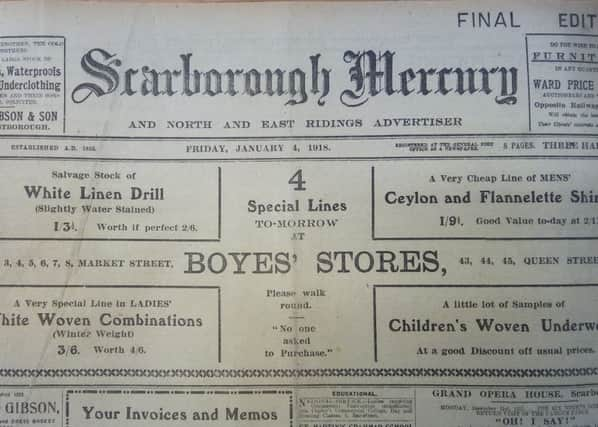1918 Court: Trader for the chop over price of bacon


He was also summoned for having failed to keep accurate records in regard to dealing with bacon at his shop as required by the provisions of the order.
Mr J Whitfield, solicitor, appeared for defendant, who was not present. Mr Whitfield explained that Mr Brown had arranged to attend, but a young woman who assisted in the shop had been taken ill and he could not be in attendance at the court without closing the shop.
Advertisement
Hide AdAdvertisement
Hide AdThe chief constable said that on the morning of December 29 PC Tilburn went to the shop and saw defendant serving a customer. Looking round the shop the officer could not see a price list displayed, and he asked Mr Brown: Have you a bacon price list? Defendant replied: No, I have not, I have only had the bacon in about a week, I have been very busy, and have not got one put up. The constable said: “I told you you must have a price list up, on 17th December.” To this defendant replied: “Yes, I know you did, I am very sorry.”
PC Tilburn gave evidence corroborating the chief’s statement.
By Mr Whitfield: He did no remember Mr Brown saying he had had no bacon in for a month before the order came in. He knew Mr Brown had not had any in for some time - this is the first time witness had seen any in the shop since the order came in.
Mr Whitfield urged that the bacon had only come in just before Christmas and defendant had not intended to sell any until it was drier, and the constable said that on 17th December Mr Brown stated he was not going to sell bacon - it was too much of a complicated business.
Advertisement
Hide AdAdvertisement
Hide AdMr Whitfield said defendant had only cut into the bacon on the day before Christmas Day to oblige a customer.
The magistrates found the case proved, but reserved their decision until the hearing of the second case.
The regard to the latter the chief submitted that the records a dealer was enquired to keep were such as would enable anybody inspecting to satisfy himself that Paragraph 6 of the Order was being complied with. A retailer had to sell at a rate per pound, which did not exceed the cost per pound by more than threepence, the retailer having an opportunity to distribute his prices according to the amount and different classes of bacon sold. The police wanted to ascertain the cost of the bacon to the retailer, plus the amount paid for carriage, and then whether he was selling it at an average price of more than threepence a pound above what he had paid. The constable asked defendant what he was selling the bacon at, and he replied 2s 2d for the best cuts and 10d per lb for the ends. The constable asked him to weigh some of the ends, and he then asked for the invoice. Mr Brown had bought one quarter, 25lbs of bacon, for £4 9s 3d, plus ninepence for carriage.
The dealer could distribute this but charged more for best cuts and less for inferior cuts, but the total profit to himself must not be more than threepence a pound on the average. Asked to produce a record, defendant could not do so.
Advertisement
Hide AdAdvertisement
Hide AdPC Tilburn gave evidence, and in reply to Mr Whitfield he said that Mr Brown stated he was asking 10d for the inferior cuts. He did not remember him saying: “I am asking 10d, but I am not sure I shall get it.”
Mr Whitfield submitted that defendant had kept sufficient records. Until, he argued, the bacon was sold it was impossible to have any accounts showing whether the threepence per lb profit had been exceeded. As a matter of fact defendant, on the sale of the whole of this bacon, made a total profit of sevenpence.
Therefore, in this case, as far from any profiteering attempt on the part of Mr Brown, it was really a matter of sheer sweating - defendant had turned over all this necessary work, for sevenpence. Mr Brown was now giving up this branch of the business and had countermanded orders for bacon coming in, so that the chief constable would have no further difficulty in regard to him. It was impossible for a man to show his profits until he had sold the goods.
The magistrates imposed a fine of £1 in each case, and said they felt that Mr Brown had not meant to gain any more profit than was allowed, but, irksome as the task might be to traders they must do their best to keep records, because the task of the whole food control, as a result of which the orders made were deemed to be necessary, was much more difficult. Traders must put personal inconvenience as much as possible in the background, and try to cooperate cordially with the wishes of the authorities.